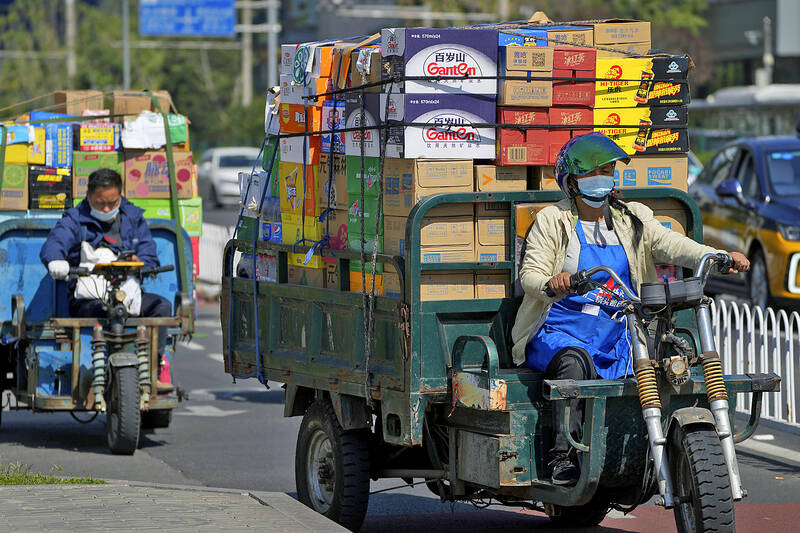The Asian Development Bank (ADB) yesterday cut its growth forecast for developing Asia for this year, with crippling COVID-19 lockdowns in China, conflict in Ukraine and efforts to combat inflation dragging on the region.
While easing COVID-19 pandemic restrictions had spurred consumer spending and investment in the region, the Philippines-based bank warned of “global headwinds” to the recovery as food and fuel prices soared, and central banks hiked interest rates.
As a result, the ADB slashed its growth forecast for developing Asia — which refers to the bank’s 46 members, stretching from the Cook Islands in the Pacific to Kazakhstan in central Asia — to 4.3 percent this year. That compares with its April forecast of 5.2 percent growth. The region grew by 7 percent last year.

Photo: AP
ADB chief economist Albert Park said “risks loom large” for the region’s outlook and urged governments to remain “vigilant.”
“A significant downturn in the world economy would severely undermine demand for the region’s exports,” Park said.
“Stronger-than-expected monetary tightening in advanced economies could lead to financial instability. And growth in the PRC faces challenges from recurrent lockdowns and a weak property sector,” he said, referring to the People’s Republic of China.
China’s growth forecast for this year was reduced to 3.3 percent from 5 percent, as Beijing pursues a “zero COVID-19” strategy that has devastated the world’s second-largest economy.
Chinese officials are under pressure to curb even the smallest virus outbreaks swiftly, ahead of a key political meeting next month in which Chinese President Xi Jinping (習近平) is expected to secure an unprecedented third term.
Officials have imposed targeted lockdowns and travel restrictions, disrupting businesses and forcing millions of people to stay home.
Park said the slowdown was “weighing heavily” on the region’s projections.
Excluding China, developing Asia would grow 5.3 percent.
“For the first time in more than three decades, the rest of developing Asia will grow faster than’ China,” the ADB said.
The bank also raised its inflation forecast to 4.5 percent from 3.7 percent, as Russia’s invasion of Ukraine and supply chain disruptions drive up food and energy prices.
While monetary policymakers in the region have hiked interest rates, some central banks might need to do more to tame inflation and prevent capital outflows, it said.

Vincent Wei led fellow Singaporean farmers around an empty Malaysian plot, laying out plans for a greenhouse and rows of leafy vegetables. What he pitched was not just space for crops, but a lifeline for growers struggling to make ends meet in a city-state with high prices and little vacant land. The future agriculture hub is part of a joint special economic zone launched last year by the two neighbors, expected to cost US$123 million and produce 10,000 tonnes of fresh produce annually. It is attracting Singaporean farmers with promises of cheaper land, labor and energy just over the border.

US actor Matthew McConaughey has filed recordings of his image and voice with US patent authorities to protect them from unauthorized usage by artificial intelligence (AI) platforms, a representative said earlier this week. Several video clips and audio recordings were registered by the commercial arm of the Just Keep Livin’ Foundation, a non-profit created by the Oscar-winning actor and his wife, Camila, according to the US Patent and Trademark Office database. Many artists are increasingly concerned about the uncontrolled use of their image via generative AI since the rollout of ChatGPT and other AI-powered tools. Several US states have adopted

KEEPING UP: The acquisition of a cleanroom in Taiwan would enable Micron to increase production in a market where demand continues to outpace supply, a Micron official said Micron Technology Inc has signed a letter of intent to buy a fabrication site in Taiwan from Powerchip Semiconductor Manufacturing Corp (力積電) for US$1.8 billion to expand its production of memory chips. Micron would take control of the P5 site in Miaoli County’s Tongluo Township (銅鑼) and plans to ramp up DRAM production in phases after the transaction closes in the second quarter, the company said in a statement on Saturday. The acquisition includes an existing 12 inch fab cleanroom of 27,871m2 and would further position Micron to address growing global demand for memory solutions, the company said. Micron expects the transaction to

A proposed billionaires’ tax in California has ignited a political uproar in Silicon Valley, with tech titans threatening to leave the state while California Governor Gavin Newsom of the Democratic Party maneuvers to defeat a levy that he fears would lead to an exodus of wealth. A technology mecca, California has more billionaires than any other US state — a few hundred, by some estimates. About half its personal income tax revenue, a financial backbone in the nearly US$350 billion budget, comes from the top 1 percent of earners. A large healthcare union is attempting to place a proposal before